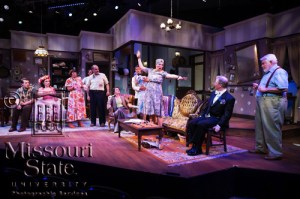by Diane Grant
Mary Steelsmith, an L.A. playwright, whom many of you might know, is one of the new vice-chairs of ALAP. We met at Googie’s (recommended – you can sit for hours and the food is great) in Santa Monica to talk about her plays and playwriting career.
One of the things we talked about is where the impulse to write plays comes from. How do we start making up stories? Why do we start thinking about plots and dialogue?
Mary started early. She was a solitary child, the last of five much older siblings. Her Dad worked for the state auditor’s office in Boise, Idaho but also ran a working farm with cows, horses, and chickens. The family lived outside of town off a dirt road at the end of the main drag called Broadway Avenue, two fields away from the Broadway Drive In movie theater. Mary says, “You could actually see the screen from my bedroom window.” She couldn’t hear anything but would watch with fascination. It was her entertainment. She could see a movie five times in a row until the feature changed and become very familiar with the narrative and the characters. She says, “Snow White and The Three Stooges were dear friends of mine,” and because she couldn’t hear what they were saying, she would make up stories about them. And put herself in the story.
The storyteller and the ambition to be a playwright were born.
She left Boise in 1976, and always enterprising, adept at making something out of nothing, she came as a babysitter for people who had a time share apartment in L.A. The people she was with didn’t like L.A. and left but the new tenants let Mary stay in a little back room for the $50 a month.
She kept writing but also she says, “wanted to see if the fat girl could become an actress.” She started getting extra jobs, was on the movie lobby card for Kentucky Fried Movie (got her friends in to see it), worked with the L.A. Connection improv group, putting out the hat on Sundays at Venice Beach, worked at an answering service at night and auditioned during the day. She got into the movie, Rabbit Test, with “this kid named Billy Crystal.”
Though she continued to act, she was always looking for places to put her plays. In Dramalogue, she saw a small ad for a workshop called Wordsmiths, a group that met once a week in the vault of what once was a bank building at 6th and Spring.
The deadline for submissions was close – “like the next Tuesday,” and Mary had to write something fast!
In the mid 1980’s, she had had a dear friend with AIDS, whom she almost married. The fear of AIDS was at its height and when Mary visited his hospital room, she had to wear yellow paper overalls, a hat and a mask and gloves. After he died, she became involved with Louise Hay’s Hay Rides, a support group for people living with H.I.V. or AIDS.
Hay’s initial meetings had grown from a few people in her living room to hundreds of men in a large hall in West Hollywood. A friend took Mary there one night and there were twelve hundred people in the room.
Hay, a spiritualist, had a simple message: “You are loved.” Mary, who had no training in the health field was told to “stand there with them,” which she did. “I would put my hands on their arms and say, ‘I love you,’ and that very night I looked over at the window and was sure that for a flash I saw my friend, Mike. It was so beautiful because I was sure I was in the right place.”
She continued to be involved and when the ad for Wordsmiths in Dramalogue appeared, had spent many nights with another friend, comforting him and taking care of him. To her surprise and sadness, at his funeral, she wasn’t acknowledged.
That experience become a thirty minute play called Bedside Companion, which she wrote in one weekend. She submitted it and was accepted into Wordsmiths.
The workshop was Mary’s first playwriting class. There was nothing like that in Boise and she had learned to write from “doing it over and over and over.”
The group would sit around a table after fighting for the good chairs, “that didn’t bend back,” and read each other’s plays out loud. Listening to playwrights reading her work was painful and instructive. When an actor sees a mistake in a line, he or she fixes it, “playwrights don’t know any better.” She heard rhythm, the sound of her dialogue, the movement of story. And she learned to rewrite.
The Wordsmiths moderator, the experienced and published fellow playwright Silas Jones, didn’t mince words and would say, “Oh, this is crap. I hate this play. Your play is not a play.” “Did I rewrite something? Oh, yeah.”
Wordsmiths has disbanded but Mary’s plays have gone on to many productions and awards. Her The Old Man and The Seed won first place in the Hewlett Packard 10 minute play contest and took her to Singapore where it was produced. Her full length, Isaac I Am, won the Helford Prize and was produced by Jacksonville University in Florida and in 2012 she was a delegate to the 9th International Women Playwrights Conference in Stockholm.








